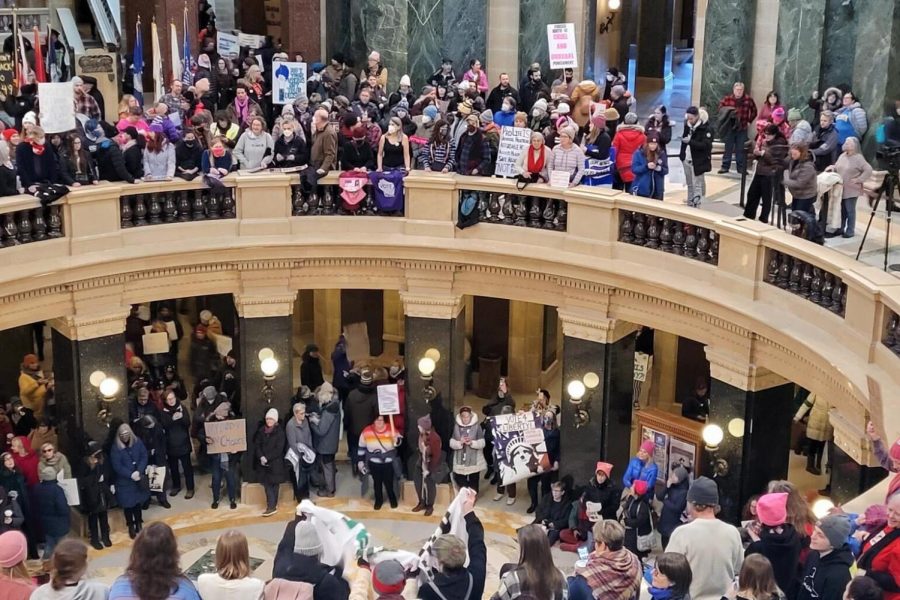‘A painful and infuriating nodal point’: Protestors advocate for abortion rights on would-be 50th anniversary of Roe v. Wade
Photo courtesy of Linda Loew of Chicago for Abortion Rights
Protestors gathered in the Wisconsin state capitol demanding abortion rights on the 50th anniversary of the Roe v. Wade decision.
January 25, 2023
Content warning: This article contains discussions of unsafe abortions.
Fifty years after the U.S. Supreme Court guaranteed a constitutional right to abortion in Roe v. Wade and seven months after the court overturned that precedent with Dobbs v. Jackson Women’s Health Organization, over a thousand protestors filled the Wisconsin state capitol Sunday to advocate for abortion rights.
Immediately after the overturn of Roe v. Wade, one in three American women lost access to abortion. Fourteen states — including Illinois neighbors Wisconsin, Kentucky and Missouri — now ban most abortions, and courts have temporarily blocked enforcement of bans in eight others.
Abortion remains legal in Illinois, so people from nearby states with little to no access often travel across state lines to seek abortion care.
“We are a safe haven. We have protections here,” Ali Cassity of Chicago for Abortion Rights said. “But because of that, it’s even more our responsibility to show up for our neighbors. They travel here so often because they have to in order to get the care that they’re looking for.”
In Wisconsin, an 1849 law banning abortion in nearly all cases resumed effect immediately after the Dobbs ruling.
Cassity traveled to Madison on Sunday with other Illinois organizers ahead of Wisconsin’s upcoming Supreme Court election, which will determine the balance of power between conservative and liberal justices and could impact the future of abortion rights.
Madison Abortion & Reproductive Rights Coalition for Healthcare hosted the Sunday protest, working with over 30 Wisconsin and Illinois organizations. Their demands included overturning Wisconsin’s abortion ban; teaching medically sound sex education for all; repealing the federal Hyde Amendment, which bans federal funding of abortions; diverting Wisconsin’s $6.6 billion tax surplus to the costs for pregnant people seeking care in other states; and re-opening the state’s reproductive healthcare clinics, which were closed by the Wisconsin legislature and state Supreme Court.
Sunsara Taylor and Merle Hoffman formed Rise Up 4 Abortion Rights alongside other activists in January 2022, when the Supreme Court appeared poised to overturn Roe.
On the 49th anniversary of Roe v. Wade, the group rallied in Washington, D.C. to announce and call for “a growing movement of mass, sustained, nonviolent protest to stop the Supreme Court from decimating abortion rights,” according to their website.
Now, Taylor said the 50th anniversary of Roe v. Wade marked a “painful, infuriating nodal point,” in part because of the countless women who have lost their lives due to a lack of access to safe abortion. According to the World Health Organization, unsafe abortion is a leading cause of maternal death.
“Thousands and thousands of women died in botched, illegal, back alley abortions,” Taylor said. “I have heard more stories than I can recount of people who held their best friends as they bled to death and couldn’t tell anybody, who lost their mothers or who nearly did. It is such a common experience.”
She and Hoffman emphasized the importance of fighting for abortion as a right that people should have nationwide, not just in individual states.
Hoffman said everyone should ask themselves what they can realistically do for abortion rights.
“Don’t look for a safe space,” Hoffman said. “There are no safe spaces in this world, particularly for women and girls. Lean into your righteous rage and act.”
Email: divyabhardwaj2025@u.northwestern.edu
Related Stories:
— Local women-owned businesses raise almost $60,000 for Planned Parenthood IL
— Pro-choice advocates march through Evanston for reproductive freedom
— What Illinois reproductive rights would look like in a world without Roe v. Wade



